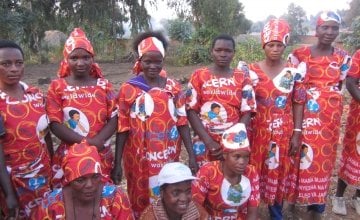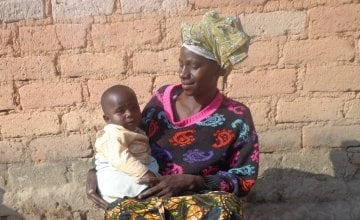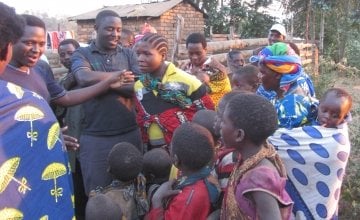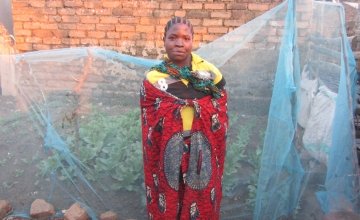
Read our 2023 annual report

Knowledge Hub
Tanzania: A SUN success story

The most recent statistics estimate that the number of children with stunted growth in Tanzania is over 3 million. Concern has worked with communities to address one of the major underlying causes of this preventable problem – poor feeding in the first two years of life.

Meet Thecla Abdul Lugenge from Iringa Region in Tanzania. She is a 35-year-old mother of five children, ranging from 11 months to 12 years old. At almost a year old, Thecla’s youngest daughter, Asha, is thriving. She has avoided the frequent bouts of diarrhoea that her siblings suffered in their infancy. Her mum puts the change down to her own increased awareness of nutrition and new knowledge about breastfeeding.
Thecla is just one of the thousands of mothers in Tanzania who has been armed with better information about maternal and child nutrition through the Scaling up Nutrition (SUN) programme.
Zero to two – the vital window
Established in 2013 by Concern and UNICEF, and recently handed over to a consortium of six other NGOs, the SUN programme works particularly with pregnant mothers and caregivers of children under two years old. It supports them to learn about maternal and child nutrition, exclusive breast feeding, complementary feeding, food and water hygiene, diversifying their diets and growing alternative foods. The focus is on the slim window of time between pregnancy and two years old – because children who don’t get the right food during this vital period can be left irreversibly physically damaged.

Mbeya, Njombe and Iringa, where Thecla is from, are the three southern regions of Tanzania with the worst record for undernutrition and therefore the focus of the SUN programme.
We don't usually associate Tanzania with low temperatures, but this area of the country endures an extremely cold season due to its high elevation. And this makes it a very difficult place to grow food. The resulting dietary limitations were startling, according to Caroline Baker who oversaw the SUN programme for Concern. She noted:
Before Concern started working on nutrition in the region, many people’s entire diet consisted of only two foods – cassava and beans! Apart from how boring this would get meal after meal, there were serious health implications, particularly for infants and young children.
From theory to practice
Through care group visits, education sessions and counselling, this programme and other Concern projects in the area, have supported communities to learn about the benefits of breastfeeding and diversifying their diet. Our teams have also helped participants to put nutrition theory into practice by creating kitchen gardens containing a variety of nutritious vegetables and building solar driers to preserve food for the lean season.

A new look at breastfeeding
The programme offers mothers like Thecla a whole new perspective on breastfeeding. Before participating in SUN, she had perceived exclusive breastfeeding for the first six months as being far too difficult. Following counselling provided by our care group, she managed to exclusively breastfeed Asha without any difficulty until she reached the six-month milestone.
And, when Asha did move onto complementary feeding, her mother was equipped with information on the five food groups that she should be consuming every day. Thecla says:
My first four children suffered from frequent episodes of diarrhoea which I haven’t experienced much with my fifth child. I think I was not feeding them correctly. Thanks to the volunteer women, they have helped a lot.
The SUN legacy
In November 2015, our team handed the SUN programme over to three international NGOs (CUAMM – Doctors with Africa; Catholic Relief Services; and PACT) who are each partnering with a local Tanzanian NGO. And, although the project is ongoing, we have already observed tangible impacts of our work, such as an increase in the availability of diverse and nutrient-rich food in households and increased awareness among pregnant women and caregivers about the nutrients they and their families need.
The new team of SUN NGOs continue to make a mark on undernutrition and childhood stunting in Tanzania’s southern highland communities – one that will endure long after the programme winds up. Caroline concludes:
Empowering and enabling care-givers was an important part of the programme because it allows the work of the programme to continue sustainably after we finish implementing.
Keep in touch
Keep up to date with all of our work and follow us on Instagram.





